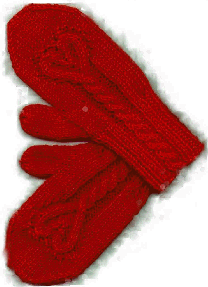

Knitting Tips
Is there a way to cast on without measuring out a long tail?
There are many, many ways to cast on.
You can knit the stitches onto your needle starting from the beginning of the yarn.
Make a slip knot and place it on the left needle. With the right needle, knit one st into
the slip knot but LEAVE THE SLIP KNOT ON THE LEFT NEEDLE. Slip the new knitted st onto the
left needle. Now you have 2 stitches on the left needle and the right one is empty. Knit the
first st, leaving it on the left needle, and slip this new st back onto the left needle.
Now you have 3 stitches on the left needle and the right needle is empty. Keep on adding stitches to
the left needle until you have the number you need. This is usually called the "knitted"
cast on.
There is a variant of this that I prefer, called the "cabled" cast on, because it makes a
nice even rope-like edge. Start with a slip knot on your left needle. Knit into it and
place the new st on the left needle. Now, instead of knitting into the new st, put the tip
of your right needle into the space between the two stitches on the left needle, and hook your
yarn for the new st through that space. Place the new st on the left needle. Continue
knitting BETWEEN the last two stitches to form new stitches until you have cast on the desired number.
If you need to loosen up your cast on, there are two ways to do this. First, as you cast on,
space your stitches out along the needle, don't jam them up tight against each other.
Second, use a single needle one or two sizes larger than the one one plan to use for your
project.
My cast on stitches are too tall.
This happens when your cast on stitches are too loose. The knitting above them keeps them
from spreading wider, so the looseness ends up as extra length. You may be using two needles
or a larger needle to prevent your cast on from being too tight. Try using a smaller needle,
until your cast on pleases you.
After casting on, am I on the right side or the wrong side?
When you use the long-tail, or Y cast on, you are actually working the first row of knit
stitches at the same time that you cast on. This cast on produces two rows of stitches that
are the equivalent of 1) using half hitches to cast on and then 2) knitting a row. This
means that when you've completed the cast on, you've already worked the first right-side row,
and should assume that your next row is row 2.
When you use the knitted or cabled cast on, you are on the wrong, or purl, side of the fabric
when you begin the next row.
Of course, if you prefer the way that one side of your cast on looks more than the other, that is
the "right" side.
Questions or suggestions?? Contact us
All text and images copyright © 1998, 2001, 2002 Margaret K.K. Radcliffe![]()
![]()
![]()
![]()
![]()
![]()
![]()
![]()
![]()
![]()
![]()
![]()